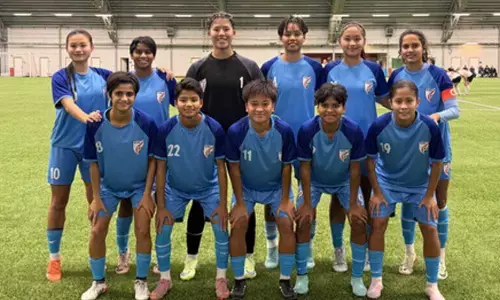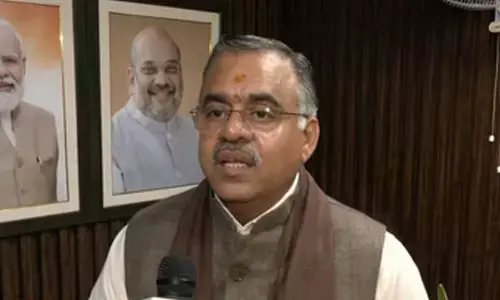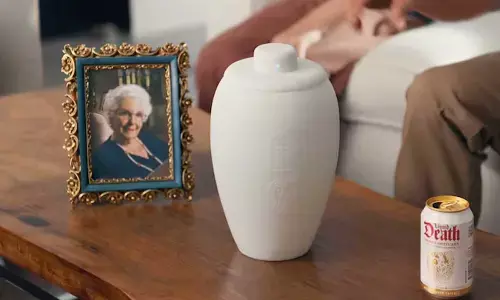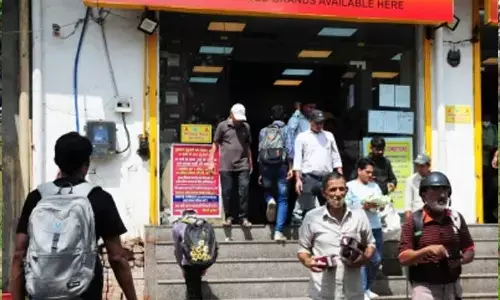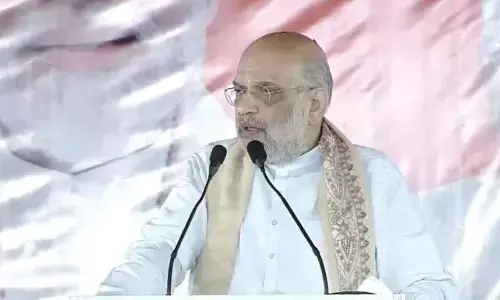Anandayya: The harbinger of happiness?
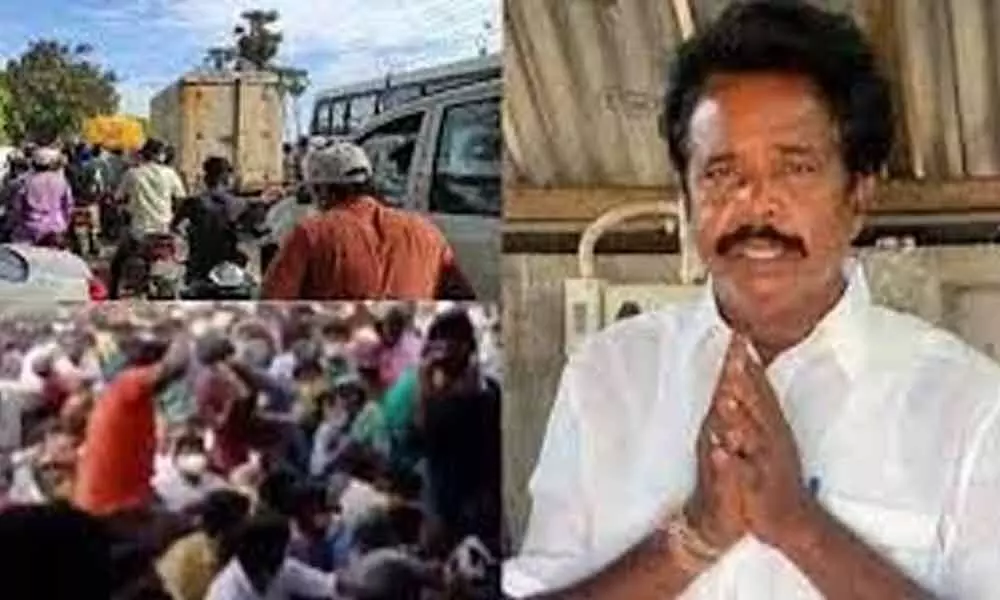
Anandayya
From November 17, 2019, the day a 55-year-old from Hubei province in China approached doctors with Covid-19 symptoms, the health and well-being of every single individual on Planet Earth has been under threat.
From November 17, 2019, the day a 55-year-old from Hubei province in China approached doctors with Covid-19 symptoms, the health and well-being of every single individual on Planet Earth has been under threat. The one-point agenda of scientists, researchers, doctors, and international agencies is to bend the Covid curve.
India wowed the world with its stringent measures, including the toughest lockdown last year. It was such a pioneering benchmark that even super powers like the USA took inspiration from the 'Indian model' to halt the macabre. India's reputation skyrocketed, thanks to the jet-speed with which vaccines were invented.
Applauds, however, were to be short-lived. Attribute it to callousness or foolishness of the highest policy-makers, we were caught off-guard when the enemy revisited in a more deadly manner in the form of a second wave. The governments' ill-preparedness was exposed in the absence of proper infrastructure and suitable medication to deal with the pandemic. From the day a Wuhan-returned 20-year-old Kerala woman registered herself at Thrissur general hospital as the country's first Covid-19 case on January 27, 2020, the virus cut short the lives of one million Indians, saysThe Economist.
Amidst the gigantic humanitarian medical crisis, the widely-accepted allopathic medicine, a system in which medical doctors and other healthcare professionals treat symptoms and diseases using drugs, radiation or surgery, has come under the scanner.Though this system is better equipped with data and case studies, compared to last year's groping in the dark situation, no protocol proved effective to contain the spread and fatalities. Even as indigenous vaccines are unavailable for all Indians, the trial-and-error method is taking a heavy toll leading to unimaginable devastation, destruction and distress.
The most inhuman aspect of the dance of death is the failure of the Indian healthcare system. Lack of infrastructure and wherewithal is a small part of the larger canvas. The worst part is the governments' failure to rein in corporate and private hospitals that are brazenly committing daylight robbery and getting away with it. A fear psychosis is haunting every household, thanks to abnormal virus and medical bills.
Even as people are suffering from breathlessness due to the pandemic and infodemic, like a whiff of fresh air comes a humble soul from Nellore district,who seems to have discovered a near-magic potion to flatten the Covid curve with the help of locally available herbs.
The 'miracle medicine' inventor Bonigi Anandayya, a self-claimed Ayurvedic medical practitioner from an obscure place Krishnapatnam, is the cynosure of all eyes. In an age when everyone tries to claim credit and applies for patents, howsoever miniscule his invention, the greatness of this man is that he has revealed the ingredients that go into the preparation without any qualms and inhibition.
Putting to shade the prophets of doom, thousands of people are rushing to Krishnapatnam. The concoction of herbal medicine has reportedly revitalised individuals, who were in near-comatose state following plummeted levels of oxygen saturation.
The eye drops given by Anandayya are being hailed as being nothing short of a miracle. Going by innumerable social media posts and clippings, most of them by the 'beneficiaries', the healing powers of the medicine are unimaginably quick. The best part of this medicine, and one which comes as a slap on the face of the materialistic, profit-minded hospitals is that it is given free of cost as a humanitarian gesture. It has brought a new lease of life into the helpless victims of private and corporate medical system.
Caught unawares by the sudden surge of patients rushing to Krishnapatnam straight from ICUs, the State government has swung into action. Apparently convinced by the Nellore District Magistrate's report that states that the medicines have not shown any visible side-effects, the Jagan Mohan Reddy government is reportedly planning to make it available to its people after getting formal approvals from competent medical authorities.
A top official of the Department of Ayurveda, Yoga and Naturopathy, Unani, Siddha and Homeopathy (AYUSH) prima-facie has given a virtual clean chit while averring that the ingredients used in the medicine are not at all harmful, albeit they could be classified as 'ayurvedic medicine.' It may be called as an 'indigenous' (naatu in Telugu) medicine. Well what's in a name! The country's premier scientific body, Indian Council of Medical Research (ICMR), is expected to give its opinion on this medicine soon.
Anandayya's medicine is in for a severe scrutiny by allopathic doctors, rationalists and other scientific-tempered activists. They rubbished the 'miracle medicine' as bogus and called for scientific substantiation and approval. I wish to argue in favour of Anandayya and call for encouraging him to continue his mission, but in a more organised and scientifically-woven manner.
First of all, one should not downgrade the allopathic medical system just to highlight Anandayya's reported triumph. Allopathy has made giant strides with mindboggling innovations and praiseworthy technological advancements. Modern medical practitioners are doing their best to ensure the overall well-being of people. Despite this, however, it is true that a large section of people is skeptical about this system, perhaps because of a plethora of diagnostic tests, awful costs, unbearable procedures, suspected side-effects or a combination of all. For every ailment, there are alternative medical experts who are as popular, if not more, as modern medicine practitioners. Many people adopt alternative medical systems, after being disillusioned with allopathy.
Many argue that Anandayya's medicine, notwithstanding the much-needed scientific back up or data analysis, is a big hit because of the failure of modern medical system. According to them, allopathic medicine for Covid is still an illusion as people are suffering in the absence of a reliable protocol. Today's medicine (Ex: Remdesiver) or method (ex: Plasma) are tomorrow's 'no-no' as new diseases like black fungus are erupting from nowhere adding to the fears of the public and the healthcare community, as a whole.
Given the ambiguity and uncertainty, there is no harm in taking Anandayya medicine since it is reportedly curing all ailments related to Covid-19. The AYUSH ministry had already launched a campaign to distribute poly herbal ayurvedic drug AYUSH 64 and Sidha medicine Kabasura Kudineer to Covid-19 patients in home isolation (mild to moderate cases). The efficacy of these drugs has been proved through robust multi-centre clinical trials, a ministry statement claimed, thereby giving enough scope to believe that Indian herbs have the medicinal value to deal with the virus.
Herbalism, in fact, is not new to human beings and it should not be seen as being anti-science. It is a traditional medicinal or folk medicine practice based on the use of plants and their extracts. It is estimated that there are about 3,50,000 species of plants, including seed plants, bryophytes, and ferns, among which 2,87,655 species have been identified, according to a paper published by Si-Yuan Pan, Gerhard Litscher and others in 2004.
Written records about medicinal plants date back at least 5,000 years to the Sumerians, who described well-established medicinal uses for such plants as laurel, caraway, and thyme. Archaeological studies have shown that the practice of herbal medicine was in vogue 60,000 years ago in Iraq and 8,000 years ago in China, researchers said. Abundant literature is available in Indian scriptures too. Kerala, Communist's fiefdom, is in the forefront of Ayurveda treatments.
According to an estimate, India possesses almost eight per cent of the biodiversity of the world with around 1,26,000 species. Of the about 400 families of flowering plants in the world, at least 315 are reportedly native to India.Isn't that a great treasure for Ayurvedic medicine system? What is harm in encouraging unsung heroes like Anandayya?
We can draw the following points from Anandayya's invention:
1. Blind rejection is as foolish as blind faith. Allopathic system should accord importance and show respect to other systems. Allopathic doctors shouldn't see Anandayya's phenomenon as an impediment to their ways of dealing things
2. Inter-disciplinary rivalry should be eschewed; knowledge sharing and regular dialogue among all medical systems should be the order of the day
3. Every effort should be made to reduce the death rate and pain by way of vigorous research and data-sharing to deal with the global humanitarian crisis
4. The common goal of all medical systems should be reducing the cost of diagnostics and treatment because people are vexed with exorbitant medical expenses.
5. Anandayya's selflessness is worth-emulating! It is a big lesson for the money-minded foursome-medical equipment manufacturers, pharmaceutical companies, corporate Hospitals and 'commercially-inclined' doctors.
Rig-Veda aptly sums up limitless open mindedness: Let noble thoughts come to us from every side (Aanobhadrakrtavo yantuvishwatah).
It is time we put it in practice and make the world a more liveable place without pain and suffering.
(The author, a PhD in Communication and Journalism, is a senior journalist, journalism educator and communication consultant)


